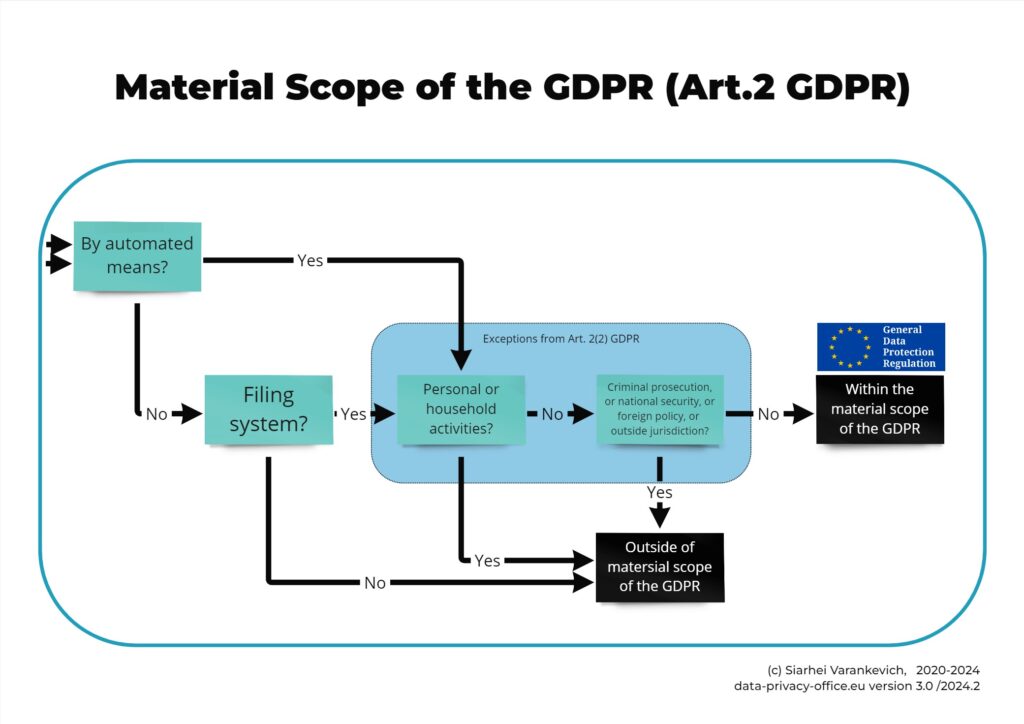(14) Ochrana, ktorá sa poskytuje týmto nariadením, by sa mala vzťahovať na fyzické osoby bez ohľadu na ich štátnu príslušnosť alebo miesto bydliska vo vzťahu ku spracúvaniu ich osobných údajov. Toto nariadenie sa nevzťahuje na spracúvanie osobných údajov, ktoré sa týka právnických osôb, a najmä podnikov založených ako právnické osoby vrátane názvu, formy a kontaktných údajov právnickej osoby.
(14) The protection afforded by this Regulation should apply to natural persons, whatever their nationality or place of residence, in relation to the processing of their personal data. This Regulation does not cover the processing of personal data which concerns legal persons and in particular undertakings established as legal persons, including the name and the form of the legal person and the contact details of the legal person.
(15) S cieľom zabrániť vzniku závažného rizika obchádzania právnych predpisov by mala byť ochrana fyzických osôb technologicky neutrálna a nemala by závisieť od použitých technologických riešení. Ochrana fyzických osôb by sa mala vzťahovať na spracúvanie osobných údajov automatizovanými prostriedkami, ako aj na manuálne spracúvanie, ak sú osobné údaje uložené v informačnom systéme alebo do neho majú byť uložené. Súbory alebo zbierky súborov, ako aj ich titulné strany, ktoré nie sú štruktúrované podľa špecifických kritérií, by nemali patriť do rozsahu pôsobnosti tohto nariadenia.
(15) In order to prevent creating a serious risk of circumvention, the protection of natural persons should be technologically neutral and should not depend on the techniques used. The protection of natural persons should apply to the processing of personal data by automated means, as well as to manual processing, if the personal data are contained or are intended to be contained in a filing system. Files or sets of files, as well as their cover pages, which are not structured according to specific criteria should not fall within the scope of this Regulation.
(16) Toto nariadenie sa nevzťahuje na otázky ochrany základných práv a slobôd ani na voľný tok osobných údajov týkajúcich sa činností, ktoré nepatria do pôsobnosti práva Únie, ako sú činnosti týkajúce sa národnej bezpečnosti. Toto nariadenie sa nevzťahuje na spracúvanie osobných údajov členskými štátmi pri vykonávaní činností v súvislosti so spoločnou zahraničnou a bezpečnostnou politikou Únie.
(16) This Regulation does not apply to issues of protection of fundamental rights and freedoms or the free flow of personal data related to activities which fall outside the scope of Union law, such as activities concerning national security. This Regulation does not apply to the processing of personal data by the Member States when carrying out activities in relation to the common foreign and security policy of the Union.
(17) Na spracúvanie osobných údajov inštitúciami, orgánmi, úradmi a agentúrami Únie sa vzťahuje nariadenie Európskeho parlamentu a Rady (ES) č. 45/2001 (6). Nariadenie (ES) č. 45/2001 a ostatné právne akty Únie, ktoré sa vzťahujú na takéto spracúvanie osobných údajov, by sa mali upraviť podľa zásad a pravidiel stanovených v tomto nariadení a uplatňovať so zreteľom na toto nariadenie. V záujme stanovenia silného a súdržného rámca ochrany údajov v Únii by po prijatí tohto nariadenia mali nasledovať potrebné úpravy nariadenia (ES) č. 45/2001, aby sa začali uplatňovať súčasne s týmto nariadením.
(17) Regulation (EC) No 45/2001 of the European Parliament and of the Council [6] applies to the processing of personal data by the Union institutions, bodies, offices and agencies. Regulation (EC) No 45/2001 and other Union legal acts applicable to such processing of personal data should be adapted to the principles and rules established in this Regulation and applied in the light of this Regulation. In order to provide a strong and coherent data protection framework in the Union, the necessary adaptations of Regulation (EC) No 45/2001 should follow after the adoption of this Regulation, in order to allow application at the same time as this Regulation.
[6] Regulation (EC) No 45/2001 of the European Parliament and of the Council of 18 December 2000 on the protection of individuals with regard to the processing of personal data by the Community institutions and bodies and on the free movement of such data (OJ L 8, 12.1.2001, p. 1). https://eur-lex.europa.eu/legal-content/EN/AUTO/?uri=OJ:L:2001:008:TOC
(18) Toto nariadenie sa nevzťahuje na spracúvanie osobných údajov fyzickou osobou v priebehu výlučne osobnej alebo domácej činnosti, a teda bez spojenia s profesijnou alebo komerčnou činnosťou. Osobné alebo domáce činnosti by mohli zahŕňať korešpondenciu a uchovávanie adries či využívanie sociálnych sietí a online činnosti vykonávané v kontexte takýchto činností. Toto nariadenie sa však vzťahuje na prevádzkovateľov alebo sprostredkovateľov, ktorí poskytujú prostriedky na spracúvanie osobných údajov na takéto osobné alebo domáce činnosti.
(18) This Regulation does not apply to the processing of personal data by a natural person in the course of a purely personal or household activity and thus with no connection to a professional or commercial activity. Personal or household activities could include correspondence and the holding of addresses, or social networking and online activity undertaken within the context of such activities. However, this Regulation applies to controllers or processors which provide the means for processing personal data for such personal or household activities.
(19) Ochrana fyzických osôb pri spracúvaní osobných údajov príslušnými orgánmi na účely predchádzania trestným činom, ich vyšetrovania, odhaľovania alebo stíhania alebo výkonu trestných sankcií vrátane ochrany pred ohrozením verejnej bezpečnosti alebo jeho predchádzania a voľný pohyb takýchto údajov podlieha osobitnému právnemu aktu Únie. Toto nariadenie by sa preto nemalo vzťahovať na spracovateľské činnosti na takéto účely. Ak sa však osobné údaje spracúvané orgánmi verejnej moci podľa tohto nariadenia používajú na uvedené účely, mal by sa na ne vzťahovať špecifickejší právny akt Únie, a to smernica Európskeho parlamentu a Rady (EÚ) 2016/680 (7). Členské štáty môžu poveriť príslušné orgány v zmysle smernice (EÚ) 2016/680 úlohami, ktoré nie sú nevyhnutne vykonávané na účely predchádzania trestným činom, ich vyšetrovania, odhaľovania alebo stíhania alebo na účely výkonu trestných sankcií vrátane ochrany pred ohrozením verejnej bezpečnosti alebo predchádzania takémuto ohrozeniu, v dôsledku čoho spracúvanie osobných údajov na tieto iné účely, pokiaľ patria do pôsobnosti práva Únie, patrí do pôsobnosti tohto nariadenia.
(19) The protection of natural persons with regard to the processing of personal data by competent authorities for the purposes of the prevention, investigation, detection or prosecution of criminal offences or the execution of criminal penalties, including the safeguarding against and the prevention of threats to public security and the free movement of such data, is the subject of a specific Union legal act. This Regulation should not, therefore, apply to processing activities for those purposes. However, personal data processed by public authorities under this Regulation should, when used for those purposes, be governed by a more specific Union legal act, namely Directive (EU) 2016/680 of the European Parliament and of the Council [7]. Member States may entrust competent authorities within the meaning of Directive (EU) 2016/680 with tasks which are not necessarily carried out for the purposes of the prevention, investigation, detection or prosecution of criminal offences or the execution of criminal penalties, including the safeguarding against and prevention of threats to public security, so that the processing of personal data for those other purposes, in so far as it is within the scope of Union law, falls within the scope of this Regulation.
Pokiaľ ide o spracúvanie osobných údajov uvedenými príslušnými orgánmi na účely patriace do rozsahu pôsobnosti tohto nariadenia, členské štáty by mali mať možnosť ponechať v platnosti alebo zaviesť podrobnejšie ustanovenia s cieľom prispôsobiť uplatňovanie pravidiel stanovených v tomto nariadení. V takýchto ustanoveniach sa môžu podrobnejšie stanoviť osobitné požiadavky na spracúvanie osobných údajov uvedenými príslušnými orgánmi na uvedené iné účely, pričom sa v nich zohľadní ústavná, organizačná a administratívna štruktúra príslušného členského štátu. Keď spracúvanie osobných údajov súkromnoprávnymi subjektmi patrí do rozsahu a pôsobnosti tohto nariadenia, mala by sa týmto nariadením členským štátom poskytnúť možnosť, aby za špecifických podmienok právnymi predpismi obmedzili určité povinnosti a práva, keď takéto obmedzenie predstavuje potrebné a primerané opatrenie v demokratickej spoločnosti na ochranu konkrétnych dôležitých záujmov vrátane verejnej bezpečnosti a predchádzania trestným činom, ich vyšetrovania, odhaľovania alebo stíhania alebo na účely výkonu trestných sankcií, vrátane ochrany pred ohrozením verejnej bezpečnosti a predchádzania takémuto ohrozeniu. Je to relevantné napríklad v rámci boja proti praniu špinavých peňazí alebo činností forenzných laboratórií.
With regard to the processing of personal data by those competent authorities for purposes falling within scope of this Regulation, Member States should be able to maintain or introduce more specific provisions to adapt the application of the rules of this Regulation. Such provisions may determine more precisely specific requirements for the processing of personal data by those competent authorities for those other purposes, taking into account the constitutional, organisational and administrative structure of the respective Member State. When the processing of personal data by private bodies falls within the scope of this Regulation, this Regulation should provide for the possibility for Member States under specific conditions to restrict by law certain obligations and rights when such a restriction constitutes a necessary and proportionate measure in a democratic society to safeguard specific important interests including public security and the prevention, investigation, detection or prosecution of criminal offences or the execution of criminal penalties, including the safeguarding against and the prevention of threats to public security. This is relevant for instance in the framework of anti-money laundering or the activities of forensic laboratories.
(7) Smernica Európskeho parlamentu a Rady (EÚ) 2016/680 z 27. apríla 2016 o ochrane fyzických osôb pri spracúvaní osobných údajov príslušnými orgánmi na účely predchádzania trestným činom, ich vyšetrovania, odhaľovania alebo stíhania alebo na účely výkonu trestných sankcií a o voľnom pohybe takýchto údajov a o zrušení rámcového rozhodnutia Rady 2008/977/SVV (pozri stranu 89 tohto úradného vestníka).
[7] Directive (EU) 2016/680 of the European Parliament and of the Council of 27 April 2016 on the protection of natural persons with regard to the processing of personal data by competent authorities for the purposes of prevention, investigation, detection or prosecution of criminal offences or the execution of criminal penalties, and the free movement of such data and repealing Council Framework Decision 2008/977/JHA (see page 89 of this Official Journal).
(20) Hoci sa toto nariadenie okrem iného vzťahuje aj na činnosti súdov a iných justičných orgánov, mohli by sa v práve Únie alebo v práve členškého štátu spresniť spracovateľské operácie a spracovateľské postupy týkajúce sa spracúvania osobných údajov zo strany súdov a iných justičných orgánov. Právomoc dozorných orgánov by sa nemala vzťahovať na spracúvanie osobných údajov súdmi pri výkone ich súdnej právomoci, aby sa zaručila nezávislosť súdnictva pri výkone jeho justičných úloh vrátane prijímania rozhodnutí. Dozor nad takýmito spracovateľskými operáciami by sa mal môcť zveriť osobitným orgánom v rámci systému súdnictva členského štátu, ktoré by mali predovšetkým zabezpečiť dodržiavanie pravidiel stanovených v tomto nariadení, zvyšovať povedomie sudcov o ich povinnostiach v zmysle tohto nariadenia a vybavovať sťažnosti súvisiace s takýmito operáciami spracúvania údajov.
(20) While this Regulation applies, inter alia, to the activities of courts and other judicial authorities, Union or Member State law could specify the processing operations and processing procedures in relation to the processing of personal data by courts and other judicial authorities. The competence of the supervisory authorities should not cover the processing of personal data when courts are acting in their judicial capacity, in order to safeguard the independence of the judiciary in the performance of its judicial tasks, including decision-making. It should be possible to entrust supervision of such data processing operations to specific bodies within the judicial system of the Member State, which should, in particular ensure compliance with the rules of this Regulation, enhance awareness among members of the judiciary of their obligations under this Regulation and handle complaints in relation to such data processing operations.
(21) Týmto nariadením nie je dotknuté uplatňovanie smernice Európskeho parlamentu a Rady 2000/31/ES (8), najmä pravidlá týkajúce sa zodpovednosti poskytovateľov služieb informačnej spoločnosti uvedené v článkoch 12 až 15 uvedenej smernice. Účelom uvedenej smernice je prispieť k riadnemu fungovaniu vnútorného trhu zabezpečením voľného pohybu služieb informačnej spoločnosti medzi členskými štátmi.
(21) This Regulation is without prejudice to the application of Directive 2000/31/EC of the European Parliament and of the Council [8], in particular of the liability rules of intermediary service providers in Articles 12 to 15 of that Directive. That Directive seeks to contribute to the proper functioning of the internal market by ensuring the free movement of information society services between Member States.








(EN) This article limits the scope of the GDPR. The European legislators have decided not to burden the majority of the population with numerous rules in the household and private life. They removed from the Regulation the processes of processing that do not pose a big threat (not automated processing where personal data is not collected in the system).
The combination “automated means” covers primarily…
(EN) […]
(EN) Sign in
to read the full text